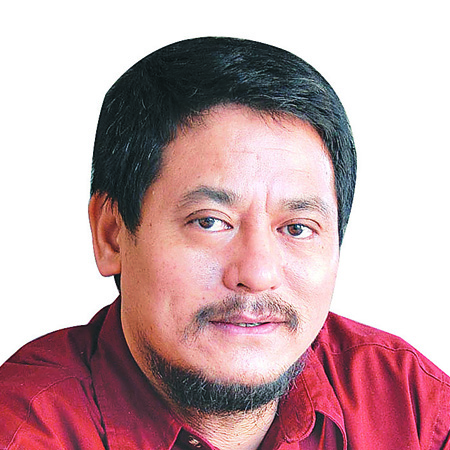Columns
Corona's new borderlines
Even the inter-provincial demarcations within a country are now becoming biometric borders.
Mahendra P Lama
The harmful tentacles of Covid-19 have transformed the very definition and content of borders in a far reaching manner. Its unknown human geography consequences, micro level socio-cultural imports and macro level politico-strategic impacts are going to be deeply reflected in the functioning of a village society, characteristics of new behavioural patterns in existing federalism, and various paradigms of international relations among nation states. Three borderline phenomena have abruptly emerged.
Firstly at the micro societal level, social distancing carved a new borderline among individuals, within families and across societies. The real threat of transmission of the virus injected a new set of restrictions like no touching, no sharing and no gathering.
In the cities, house maids stopped doing their chores, milkmen and newspaper vendors were kept at bay, and shopkeepers started dealing with customers in the outer ring of their vicinity. Under the unpolluted blue sky, even the gods, devi-devta and deities are locked up as if we are uncertain about their performance and fate.
Amidst the government's trying to replicate the much successful South Korean model of ‘trace, test and treat’, some fragments in fact jealously reasserted their old habits.
Secondly, a news item said that 'the Meghalaya government has appealed to citizens living along the international and inter-state borders to remain vigilant and not allow the entry of people either from Bangladesh or Assam in a bid to contain Covid-19'. 'Bihar seals borders for migrants' was another headline. Following Tamil Nadu and Kerala, Karnataka also sealed its borders with five neighbouring states—Kerala, Tamil Nadu, Maharashtra, Andhra Pradesh, Telangana and Goa.
Physical restrictions
All inter-state buses, railways and airways were shut down after Prime Minister Modi’s March 25 announcement of an all-India lockdown. Similarly, Wuhan in Hubei, China closed its borders with neighbouring provinces for over 70 days. Hong Kong and Macao stopped allowing people from mainland China. In the United States, New York, New Jersey and Connecticut inhabitants have been advised to refrain from non-essential travel while Florida has begun stopping drivers at its borders with Alabama and Georgia.
These are all unprecedented emergency physical restrictions generally not covered by any constitutional and institutional provisions. In a way, even the inter-provincial demarcations within a country are now becoming bio-metric borders. The provinces and states have become extraordinarily assertive and powerful while safeguarding their interests. At the same time, further deepening of the pandemic may intensify drawing of border lines among the districts within a province.
The latest emerging revelation that 80 percent of the confirmed cases in India are located in 62 districts across the country would demystify the epicentre phenomenon of Wuhan. That means test and treatment would be much more targeted. At the same time, contiguous districts and cities will largely be subjected to fear-centric and near vulnerability paralysis. This requires a huge overhauling of the governance structure and a constant assurance of finance and infrastructure. For how long can the governments withstand these pushes and pulls?
Thirdly, the very origin of Covid-19 in China tantalisingly caused international borders to be closed first by its immediate neighbours and later by all the affected countries. Nepal, India and Singapore all did it. It started destabilising the larger and assiduously evolved border movement agreements like the Maastricht Treaty (1992) that facilitated the European Union, European citizenship, euro currency and allowed its citizens to reside in and move freely between its 27 member states. This was further consolidated by Blanca Balleste’s The Cost of Non-Europe idea (2013).
Covid-19 hits at the heart of these open smart borders based on the Maastricht spirit already beleaguered by Brexit. The free movement of natural persons based on the Schengen States visa policy remains deeply strained and challenged today. Amidst India salvaging neighbouring countries’ students from Wuhan, some other nations are now turning inward looking as indicated by the Australian prime minister’s call to visa holders to leave if they are unable to support themselves.
The much celebrated unhindered movement of people in the bilateral open border regime of India, Bhutan and Nepal is also stressed. The Kathmandu Post headlined 'Following Cabinet’s decision to close borders, hundreds of Nepalis faced a long day on Monday at the border' at Mechi bridge in Kakarbhitta. Another report went, 'Over 300 Nepalis stranded at the Darchula border point, demand passage home'. In Jaigaon on the West Bengal-Bhutan border, Indian traders faced a serious currency crisis as they could not enter Bhutan to exchange the Bhutanese currency, the ngultrum, because of the lockdown.
Cascading effects
All these had their own cascading effects on the movement of people, goods and services. All transportation closed, factories were shut, cities remain deserted, financial and trading institutions are immobilised, and more seriously, distribution systems remain intensely disrupted. Unlike China’s strict legal binding like Hukou that physically limits interprovincial movement of labour, cross-country internal migration remains absolutely unhindered in India. That is why a large portion of the abruptly uprooted seasonal and occupational migrants numbering 60-65 million harrowingly struggled to move to their respective states. When the West Bengal chief minister asked other chief ministers to take care of migrants from West Bengal, it only indicated the scale of the length and breadth of the distance they travel for their livelihood.
In a way, Covid-19 has deliberately and blatantly backstabbed the globalisation process. It disregarded all variables and used the most favoured nation treatment clause to address and incorporate all super and local powers, hemisphere and ecology, modern and traditional, technological heart and natural soul, and muscular and feeble. It is now throwing tantrums of de-globalisation, fragmentation, compartmentalisation and localisation only to drive home the point that it is human civilisation and its craving for prodigal profligacy that actually begot and will sustain this virus. In the repeat of a pandemic like this in more devouring forms, nation states will be forced to fight for sub-regional and local identities rather than a continental and global space.
***
What do you think?
Dear reader, we’d like to hear from you. We regularly publish letters to the editor on contemporary issues or direct responses to something the Post has recently published. Please send your letters to [email protected] with "Letter to the Editor" in the subject line. Please include your name, location, and a contact address so one of our editors can reach out to you.




 9.89°C Kathmandu
9.89°C Kathmandu















